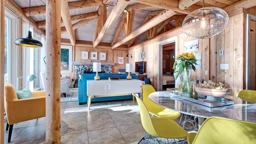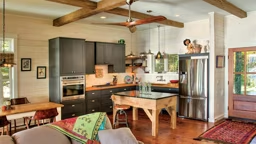
Soaring temperatures have broken records this summer season and it looks heat waves could be the new normal. According to a study published last summer in Nature Climate Change, 75 percent of people on earth could be subject to nearly three weeks of deadly heat waves by the year 2100. For the one-third of people who experience extreme heat and humidity, we’ve put together a guide to help you best equip your home rising temperatures.
Room air conditioner options
If you’re one of the many Americans who frequent the cabin on the weekends, a portable air conditioning unit is a great option to keep your smaller home-away-from home cool during the hotter months. Portable units are a great option for those who are not yet ready to make the jump to a central cooling system. Their simple design is fairly inexpensive and comes in a variety of appearances, ranging from just a few hundred to a few thousand dollars—depending on how much power your cabin needs.For those living in hotter climates or who spend more time at their cabin, room air conditioners provide a bit more oomph when it comes to cooling power. About 25 percent of American households have an air conditioner because they are such a great way to quickly and efficiently cool down entire rooms. Most models cost under $1,000 and are a great option for people who do not own the property and don’t wish to invest in a long-term cooling option. Most room units are easy to install and require very little setup. Smaller air conditions draw less power and can also be plugged into electrical outlets.
There are a several types of room air conditioners to consider when shopping around. Window air conditioners are popular because they fit most single- or double- windows and come with accordion panels that ensure a snug fit. On the other hand, installing wall air conditioners is a bit more involved and requires a hole in an exterior wall. These units are worth the cost of a professional installation because they don’t take up window space and are a bit more airtight.
When you open your home for the season, plug the system into an electrical outlet or remote power source like a small generator or invertor. Before winterizing your home, portable units can be transported and stored away until the next season. Some units also have a heating option, making them ideal for cabins used during hunting and fishing seasons.
Portable air conditioners are a great alternative for people who wish to have a little environmental impact or are on a tighter budget. According to a 2013 report, portable units use one-eighth the amount of electricity needed to run a central system but don’t provide as much cooling power and only about half the amount of cooling as window air conditioners.
Energy Efficiency Rating
To some, living the cabin life means having a minimal impact on the environment and using as little resources as possible. Even the best air conditioning systems still consume a major amount of energy. The U.S. Energy Information Administration (EIA) estimates between 6 and 25 percent of a household’s annual energy comes from cooling the home, costing homeowners more than $11 billion each year. In 2015, 67 percent of energy produced in the U.S. was generated from fossil fuels, according to HVAC. Taking your cooling unit off-the-grid is a great way to conserve energy and lower your carbon footprint. You can do this by operating units off of solar panels, geothermal energy, or using evaporative techniques.Air conditioners use enough electricity that they are required to have an Energy Efficiency Rating (EER). These ratings help guide consumers by making conscious decisions in purchasing units that are better on the environment; higher the rating, the better the unit. Features such as variable fan speeds, easy-to-access filters, timers, energy-saving settings, programmable thermostats, and digital temperature controls lead to a higher rating.
Whether you’re a snow bird or enjoy your cabin year-round, choosing an efficient air conditioner is vital to keeping your home and loved ones safe during intense heat events.










